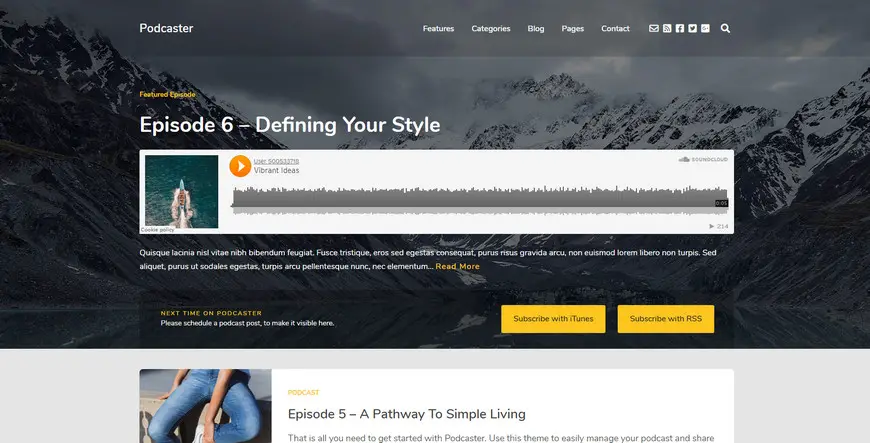How To Podcast Using WordPress
Posted 2021-09-16 16:13:11
0
0
A podcast is the next step up from blogging. While blogging is performed by a swarm of pajama-clad normal people, podcasting is done by the same people, though less often in pajamas, behind a computer and audio recorder. Short pieces are recorded, then released via RSS 2.0 or Atom to their websites, typically a blog site. Viewers and listeners are able to download podcasts by using podcast clients. A reliable podcast client (for example, Juice, CastPodder, or iTunes) can allow you to subscribe to the RSS/Atom feed of your preferred podcasters and immediately download the content to either a computer or portable audio player as new podcasts are released.
Most podcasters create their content as MP3 or MP4 video or audio files and upload themto the internet, including the link to the file in the blog post. The users can click the link to download the file even if they're not subscribed automatically to the RSS/Atom feed. The problem has never been how to upload the content onto the web page but rather getting the content to function through the feed systems. WordPress generally will automatically incorporate new information about podcasting in your RSS/Atom feeds. This makes it simple for you to publish content and for your customers to subscribe to the content.
For the majority of users, WordPress 1.5 and above can podcast quickly and easily. When you hyperlink to the audio file within an WordPress blog post, using the full URL, it integrates it into the RSS/Atom feed and makes it a podcast. Be sure to make use of a complete address:
Wrong: My podcast
Right: My podcast

Your final step is to include an URL for your RSS/Atom feed on your page. The feeds appear at the bottom of the WordPress page. The URL should look like this in case you're using RSS
In the earlier versions of WordPress, automated links work for posts only, but not in static websites. Since WordPress requires exact information on file size in case you modify a linked file you should be sure to publish a new post with the link. If you've linked to a file which has any reason to not be fully accessible via your blog then your podcast will not function correctly when it's published because WordPress does not have the correct information about the size of the file.
For Apache servers and other servers that use using the .htaccess file, you'll have to add a directive to the configuration document or .htaccess file to get servers to be able to detect podcast file formats (m4a and m4b) correctly. It's as easy as adding this line to the file you're using:
Most podcasters create their content as MP3 or MP4 video or audio files and upload themto the internet, including the link to the file in the blog post. The users can click the link to download the file even if they're not subscribed automatically to the RSS/Atom feed. The problem has never been how to upload the content onto the web page but rather getting the content to function through the feed systems. WordPress generally will automatically incorporate new information about podcasting in your RSS/Atom feeds. This makes it simple for you to publish content and for your customers to subscribe to the content.
For the majority of users, WordPress 1.5 and above can podcast quickly and easily. When you hyperlink to the audio file within an WordPress blog post, using the full URL, it integrates it into the RSS/Atom feed and makes it a podcast. Be sure to make use of a complete address:
Wrong: My podcast
Right: My podcast

Your final step is to include an URL for your RSS/Atom feed on your page. The feeds appear at the bottom of the WordPress page. The URL should look like this in case you're using RSS
In the earlier versions of WordPress, automated links work for posts only, but not in static websites. Since WordPress requires exact information on file size in case you modify a linked file you should be sure to publish a new post with the link. If you've linked to a file which has any reason to not be fully accessible via your blog then your podcast will not function correctly when it's published because WordPress does not have the correct information about the size of the file.
For Apache servers and other servers that use using the .htaccess file, you'll have to add a directive to the configuration document or .htaccess file to get servers to be able to detect podcast file formats (m4a and m4b) correctly. It's as easy as adding this line to the file you're using:
Zoeken
Categorieën
- Art
- Causes
- Crafts
- Dance
- Drinks
- Film
- Fitness
- Food
- Spellen
- Gardening
- Health
- Home
- Literature
- Music
- Networking
- Other
- Party
- Religion
- Shopping
- Sports
- Theater
- Wellness
Read More
BERBAGAI Model PERATURAN BERMAIN Gambling POKER ONLINE
Bermacam Kategori Peraturan Bermain Gambling Poker Online ? Pada tulisan tempo ini abdi akan...
Plastic Processing Machinery Market Size | Share | Trend | Global Industry Growth Prospects to 2027
Plastic Processing Machinery Market Highlights:
Plastic processing utilizes a huge amount of...
How Can Strata Painting Help in Enhancing the Value of Your Building?
Are you psychologically getting affected due to the old and boring appearance of your office? Are...
Choosing The Right Company For Your Payday Loans
Are you having trouble paying a bill right now? Do you need a few more dollars to get you through...
DIFFERENT TYPES OF HAIR EXTENSIONS
There are so many different types of hair extensions that we will discuss, but first, let's look...

